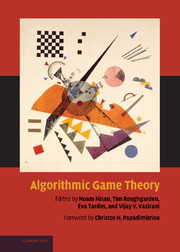Book contents
- Frontmatter
- Contents
- Foreword
- Preface
- Contributors
- I Computing in Games
- II Algorithmic Mechanism Design
- 9 Introduction to Mechanism Design (for Computer Scientists)
- 10 Mechanism Design without Money
- 11 Combinatorial Auctions
- 12 Computationally Efficient Approximation Mechanisms
- 13 Profit Maximization in Mechanism Design
- 14 Distributed Algorithmic Mechanism Design
- 15 Cost Sharing
- 16 Online Mechanisms
- III Quantifying the Inefficiency of Equilibria
- IV Additional Topics
- Index
14 - Distributed Algorithmic Mechanism Design
from II - Algorithmic Mechanism Design
Published online by Cambridge University Press: 31 January 2011
- Frontmatter
- Contents
- Foreword
- Preface
- Contributors
- I Computing in Games
- II Algorithmic Mechanism Design
- 9 Introduction to Mechanism Design (for Computer Scientists)
- 10 Mechanism Design without Money
- 11 Combinatorial Auctions
- 12 Computationally Efficient Approximation Mechanisms
- 13 Profit Maximization in Mechanism Design
- 14 Distributed Algorithmic Mechanism Design
- 15 Cost Sharing
- 16 Online Mechanisms
- III Quantifying the Inefficiency of Equilibria
- IV Additional Topics
- Index
Summary
Abstract
Most discussions of algorithmic mechanism design (AMD) presume the existence of a trusted center that implements the required economic mechanisms. This chapter focuses on mechanism-design problems that are inherently distributed, i.e., those in which such a trusted center cannot be used. Such problems require that the AMD paradigm be generalized to distributed algorithmic mechanism design (DAMD).
We begin this chapter by exploring the reasons that DAMD is needed and why it requires different notions of economic equilibrium and computational complexity than centralized AMD. We then consider two DAMD problems, namely distributed VCG computation and multicast cost sharing, that illustrate the concepts of ex-post Nash equilibrium and network complexity, respectively.
The archetypal example of a DAMD challenge is interdomain routing, which we treat in detail. We show that, under certain realistic and general assumptions, one can achieve incentive compatibility in a collusion-proof ex-post Nash equilibrium without payments, simply by executing the Border Gateway Protocol (BGP), which is the standard for interdomain routing in today's Internet.
Introduction
To motivate the material in this chapter, we begin with a review of why game theory is relevant to computer science. As noted in the Preface to this book, computer science has traditionally assumed the existence of a central planner who dictates the algorithms used by computational nodes. While most nodes are assumed to be obedient, some nodes may malfunction or be subverted by attackers; such byzantine nodes may act arbitrarily.
Information
- Type
- Chapter
- Information
- Algorithmic Game Theory , pp. 363 - 384Publisher: Cambridge University PressPrint publication year: 2007
Accessibility standard: Unknown
Why this information is here
This section outlines the accessibility features of this content - including support for screen readers, full keyboard navigation and high-contrast display options. This may not be relevant for you.Accessibility Information
- 15
- Cited by
